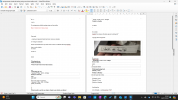TimBourne
Mr
Implementing habit tracking with GTD, giving example of Loop Habits App
Topic one
Dear GTD, one of the things I feel like personally I haven't seen very much of on this fourm is about the topic of habits? Haven't seen anything on forum like "habit tracker" writing about it. - A persons from a type of organisation spiritual - made an idea suggestion for self improvement it could help to use a type habit tracker app - gave type example "Loop habits" as shown in this picture:

... Myself Tim - when initially hearing/listening to that advice -was type of persons probably thought - well really am not sure if that is worth while? with someone like myself (who already does a certain amount of things according to habit " - then like maybe four to seven days ago - I had the idea well why not actually try something using a type of phone application "loop habits " - I could try do something like link it to GTD practices as well . "
It occurred to myself overall -* a person struggling with GTD*
A point is - is I feel like there are a whole certain amount of habits I haven’t been able successfully implement, could list them from knowledge now:
1st example could be something Rene @René Lie shared before - that I should try to put All “task” titles in list managers (or tasks in life in general) as concede(concise) as possible (and make sure that they include a verb (doing of what the action is)
Felt 2) haven’t done daily reviews best (with the three things of calendar checking, next actions of list manager and inboxes) best - so I put on the loop tracker habit do this at leas once day literally to start
3) - Not being aware - or loosing focus/attention - to see recognize when the <2mins would be done rule applies to real life organizing/tidying micro management etc
Other things come to mind are : habits for properly titling/naming digital documents - sometimes actually still don't do
Cos voice in head said - with my condition/circumstance my calendar management seems * * [hands in the air emoji] or
Then - the other things in picture: show in red type things labelled key things to do with fitness or skill applies to anyone
And in blue - is type mental or spiritual practices
And had idea - add green section- for types of things which actually noticed are habits -but a very small amount of times will actually forget to do them
" I could upload the official loop habit tracker website link , edit this post if I see gets feed back @cfoley or @DKPhoto or @Mrs-Polifax or @gtdstudente or @Bra
P. S.
"
Idea occurred - could put background habitual list of things which I feel - are in background ( e.g. I feel with my list manager - the example Asana - the inputs within the projects are generally to detailed/wordy and cluttered ? Were they the right words?
What else? Not computer tabs or history"
++++++++++++++++++++++++++++++++++++++++++++++++++++++++++++++++++++++++++++++++++++++++++++++++++++++++++
Topic Two Question of what is best to do when you don't have a day off to do weekly review at weekend?
I could give an example where basically I got put a shift in on Sunday, schedule changed(to day normally do weekly review on) - so I decided to not do it that day, am doing it this day on Monday - I was thinking in hindsight if this situation happens again, then it makes more sense to try to do the weekly review the day before? or ASAP when get back from shift?
If - I am telling myself that I want to try implement the GTD system best as possible as much as possible etc ... "
Topic one
Dear GTD, one of the things I feel like personally I haven't seen very much of on this fourm is about the topic of habits? Haven't seen anything on forum like "habit tracker" writing about it. - A persons from a type of organisation spiritual - made an idea suggestion for self improvement it could help to use a type habit tracker app - gave type example "Loop habits" as shown in this picture:

... Myself Tim - when initially hearing/listening to that advice -was type of persons probably thought - well really am not sure if that is worth while? with someone like myself (who already does a certain amount of things according to habit " - then like maybe four to seven days ago - I had the idea well why not actually try something using a type of phone application "loop habits " - I could try do something like link it to GTD practices as well . "
It occurred to myself overall -* a person struggling with GTD*
A point is - is I feel like there are a whole certain amount of habits I haven’t been able successfully implement, could list them from knowledge now:
1st example could be something Rene @René Lie shared before - that I should try to put All “task” titles in list managers (or tasks in life in general) as concede(concise) as possible (and make sure that they include a verb (doing of what the action is)
Felt 2) haven’t done daily reviews best (with the three things of calendar checking, next actions of list manager and inboxes) best - so I put on the loop tracker habit do this at leas once day literally to start
3) - Not being aware - or loosing focus/attention - to see recognize when the <2mins would be done rule applies to real life organizing/tidying micro management etc
Other things come to mind are : habits for properly titling/naming digital documents - sometimes actually still don't do
Cos voice in head said - with my condition/circumstance my calendar management seems * * [hands in the air emoji] or
Then - the other things in picture: show in red type things labelled key things to do with fitness or skill applies to anyone
And in blue - is type mental or spiritual practices
And had idea - add green section- for types of things which actually noticed are habits -but a very small amount of times will actually forget to do them
" I could upload the official loop habit tracker website link , edit this post if I see gets feed back @cfoley or @DKPhoto or @Mrs-Polifax or @gtdstudente or @Bra
P. S.
"
Idea occurred - could put background habitual list of things which I feel - are in background ( e.g. I feel with my list manager - the example Asana - the inputs within the projects are generally to detailed/wordy and cluttered ? Were they the right words?
What else? Not computer tabs or history"
++++++++++++++++++++++++++++++++++++++++++++++++++++++++++++++++++++++++++++++++++++++++++++++++++++++++++
Topic Two Question of what is best to do when you don't have a day off to do weekly review at weekend?
I could give an example where basically I got put a shift in on Sunday, schedule changed(to day normally do weekly review on) - so I decided to not do it that day, am doing it this day on Monday - I was thinking in hindsight if this situation happens again, then it makes more sense to try to do the weekly review the day before? or ASAP when get back from shift?
If - I am telling myself that I want to try implement the GTD system best as possible as much as possible etc ... "


